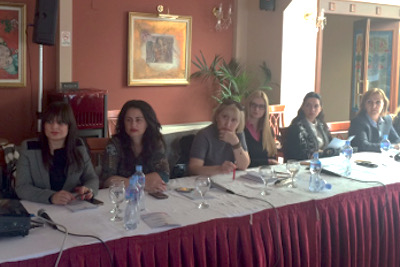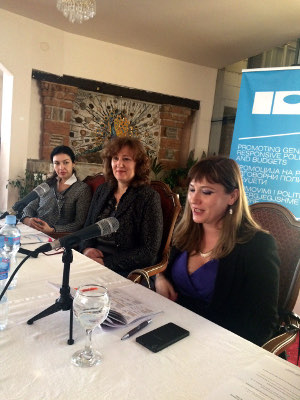Macedonian town adopts gender equality strategy
Calling for equal access to resources, gender mainstreaming and gender-sensitive budgets, Bitola municipality’s gender equality strategy includes action plan with specific activities and timeframe.Date:

The Macedonian municipality of Bitola adopted a strategic plan to advance gender equality in its local programs. In March 2016, the Municipality of Bitola promoted the Strategy to a broad network of NGOs, councilors and the local administration. The second Macedonian town to adopt a gender equality plan, Bitola is one of ten Macedonian municipalities participating in a UN Women regional project that works to promote gender responsive budgeting across South East Europe and Moldova.
For the past two years, the project, Promoting Gender Responsive Policies In South East Europe And The Republic Of Moldova, has worked with local governments in Macedonia to integrate into their planning gender-responsive budgeting, which analyses budgets to find and close gender bias in funding and ensure that gender equality and women’s empowerment programs are adequately funded.
Bitola’s gender equality strategy:
- Emphasizes access to resources to achieve gender equality in education, culture, sports, health care and social protection;
- Introduces gender mainstreaming into Bitola’s local politics to increase the participation of both women and men in decision-making processes;
- Strengthens institutional capacities to carry out gender equality policies and ensure that budgets are gender sensitive, and
- Includes a practical action plan with specific activities and a concrete timeframe.

Initiated by the Commission for Equal Opportunities, the development of Bitola’s gender equality strategy included the participation throughout of both women and men and all town council members. It began with a two-day strategic goals and objectives workshop that included council members, the Municipal Coordinator for Equal Opportunities, and the State Advisor for Equal Opportunities and Non-discrimination.
Marija Risteska, a UN Women consultant who acted as municipal mentor, explained why the making of Bitola’s strategy for gender equality was so unique: “In times of high political polarization, the councillors and administration representatives of Bitola showed they can work together as a team when higher goals are at stake.”
“They brought important insights in the understanding of the status of women and men in Bitola and in identifying municipal interventions for transformative policies to improve the status of everyone in Bitola, especially women,” added Ms. Risteska.
Next came the challenging phase of drafting the strategy. This delicate process was carefully facilitated by Bitola’s Gender Equality Coordinator, Violeta Nalevska, and included participation of council members. The last stage included consultation with civil society that provided feedback to council members before they formally adopted the gender equality plan at a council session.
“The strategy aims to introduce the concept of gender mainstreaming in the development of local policies and to increase citizens’ awareness of the benefits of gender responsive policies,” said Ms. Violeta Nalevska. “This will enhance equality between women and men and create mechanisms and a positive environment to achieve gender equality in municipal life.”